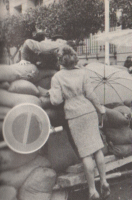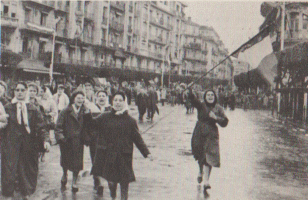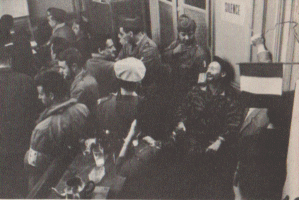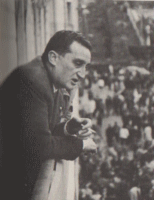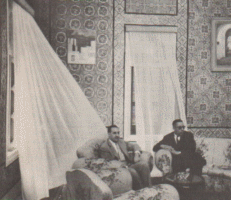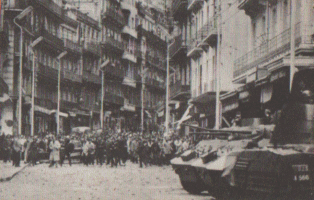 SKC Films Library SKC Films Library |
| SKC Films Library >> General and Old World History >> Africa >> Algeria |
| Algeria in 1960 Europeans living in Algeria sought French protection from Algerians seeking independence from France, which led to an insurrection staged by Europeans and put down by the French who were supposed to be protecting them. Population in 1960 9,925,000 On January 4, a summary of a report made by an International Red Cross mission sent to inspect detention camps and prisons in Algeria was published in Le Monde. The mission reported that while there had been some improvement since an inspection two years earlier, torture was still sometimes used and many other changes were still needed. The Le Monde issue in which the summary was published was confiscated in Algiers. A reorganization of the provisional government of the Algerian Republic (G.P.R.A.) was announced in Tunis, Tunisia, on January 19. At the same time a three-man "war committee" was set up to direct operations of the Front de la Libération Nationale (F.L.N.). In early January, F.L.N. terrorist activities in the Algiers area were stepped up, and European demands for proection and criticism of French President Charles De Gaulle's self-determination policy increased. An interview with Major General Jacques Massu, commander of the Algerian Army Corps, in which he allegedly criticized De Gaulle was published in a German newspaper. Massu was dismissed on January 22. Two days later an insurrection broke out among the Europeans in Algiers. Its leaders included Joseph Ortiz, head of the ultrarightist French National Front, and Pierre Lagaillarde, a deputy in the National Assembly. The insurgents raised barricades in the streets and occupied a number of buildings. Several police were killed or wounded while trying to break up a crowd in front of the Algiers war memorial, and a state of siege was proclaimed by General Maurice Challe, the French commander in chief. An appeal by Delegate-General Paul Delouvier for the insurgents to disperse was ineffective, as were appeals by the insurgents to the Moslem population to join them. On January 29, De Gaulle broadcast his determination to restore order and to continue his Algerian policy. The French Army in Algeria remained loyal to De Gaulle and on February 1 the insurgents surrendered, although Ortiz and some other leaders escaped. The trial of captured leaders began in November. The wife of an insurgent visits
her husband at one of the barricades erected in Algiers. European women in Algiers
demonstrate their support for the insurgent cause. Pierre Lagaillarde laughs as he
listens to De Gaulle's radio speech. Joseph Ortiz addresses a crowd
assembled beneath his balcony. Several moves were made to strenghten governmental control in February, including dissolution of the Front National Français and other extremist movements and reorganization of the Algerian police. On February 14 a Committee for Algerian Affairs was established, composed of the French President, Prime Minister, Minister of the Interior, and Minister of the Armed Forces. In April General Jean Crépin succeeded General Challe. Elections for the General Councils of the 13 Algerian Departments were held in late May, for the first time on a single electoral register. Despite G.P.R.A. appeals for Moslems to stay away from the polls, about 56% of those eligible voted. The majority of successful candidates were Moslem supporters of De Gaulle. On June 14 De Gaulle broadcast a renewal of his offer of cease-fire discussions. Talks were held at Melun, near Paris, soon after, but no concrete resolutions were reached. Ferhat Abbas,
Premier of the Algerian provisional government, and his
Minister of Information, M'hammed Yazid confer in Tunisia
concerning the meetings in Paris in June. On December 9 De Gaulle began a tour of the country. Although he was well received by the Moslems, rioting broke out and there was fighting between Moslems and Europeans, during which French troops fired on the Moslems. In Algiers, about 100 people were killedd and another 1,500 wounded. De Gaulle returned to France on December 13, ahead of schedule. On December 19 an Afro-Asian resolution recognizing the right of the Algerian people to self-determination and independence was passed by the United Nations General Assembly. European Algerians hurl rocks at
French Army troops during De Gaulle's December visit. SOURCE SEE ALSO |
| SKC Films Library >> General and Old
World History >> Africa >> Algeria This page was last updated on May 26, 2017. |
